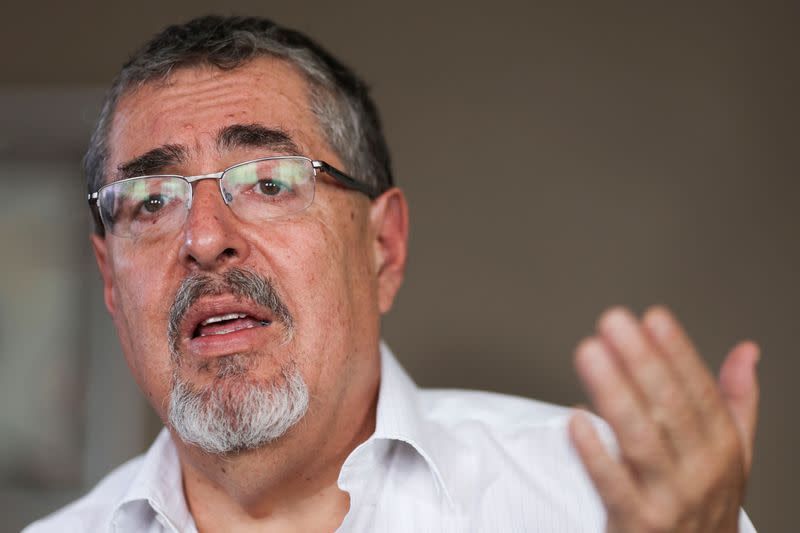Guatemala's Arevalo wants more US temporary work programs to stem migration
By Cassandra Garrison and Sofia Menchu
GUATEMALA CITY (Reuters) -Bernardo Arevalo, who won Sunday's Guatemalan presidential runoff by a landslide, said he wants to work with the U.S. to expand temporary work programs for migrants there, while also increasing investment in his country's poorest areas to reduce departures.
In an interview with Reuters on Tuesday, the 64-year-old center-left anti-corruption crusader said the U.S. and Guatemala must sit down to "find ways to influence a phenomenon that we share."
"We want to have a very serious discussion around a very significant expansion of the temporary work programs," Arevalo said at his home in Guatemala City.
"Managed in a way where access is expanded to (poverty-stricken) places, they can become an additional measure to mitigate the pressure on people to leave."
More migrants have left from Guatemala for the U.S. border than from any other "Northern Triangle" country in recent years. Over 233,000 Guatemalans arrived at U.S. borders in 2022, about 8.4% of all arrivals.
Arevalo, an ex-diplomat and son of a former president, rose speedily from relative obscurity to win the presidency as support surged for his anti-establishment, reformist message.
Arevalo said he sees his mandate as having three pillars: addressing a culture of mistrust; creating more economic opportunities; and expanding access to healthcare and education.
He said his government will focus on expanding development to combat malnutrition and unemployment in Guatemala's Dry Corridor, an area that stretches across Central America and is particularly vulnerable to climate change and drought.
Many analysts regard Arevalo's victory as a potentially definitive moment for Guatemala, with voters rejecting a powerful status quo dogged by allegations of widespread corruption.
Arevalo said fighting graft and restoring confidence in democracy will be at the forefront of his administration and that he will seek a foreign agenda that supports these goals.
CHINA AND TAIWAN
Guatemala, Central America's most populous country, has for decades maintained formal ties with Taiwan. Arevalo wants to maintain those ties - but he also wants to improve relations with China.
It would be an act of foreign policy gymnastics, given China's position that countries it has relations with cut off ties with Taipei.
"We believe it is perfectly feasible to have good relations with both the (People's) Republic of China and Taiwan," said Arevalo.
Guatemala's private sector was interested in expanding relations with China, which counts the Central American country as its main trade partner in the region, Arevalo added.
Taiwan's foreign ministry said it was confident of continued cooperation with Guatemala's new government on the basis of existing good foundations, noting relations were broadly supported in the Central American country.
A day after the Guatemalan presidential runoff, the six-nation Central American Parliament known as the Parlacen voted to expel Taiwan after more than two decades as a permanent observer and replace it with China, whose growing economic influence in Latin America has increasingly marginalized Taipei.
Guatemala is the only Parlacen member that still recognizes Taiwan.
In the run-up to Sunday's election, Arevalo and his Semilla party had faced legal challenges over alleged registration irregularities and the party was briefly suspended at the request of a prominent prosecutor before Guatemala's top court reversed the ban.
International experts have speculated the attorney general could continue to launch legal challenges that threaten the transition of power.
But after securing more than 58% of the vote in the runoff, Arevalo said he was confident he will assume office as planned on Jan. 14.
"The people of Guatemala spoke, and spoke very clearly and forcefully, and that is a fact that is going to weigh heavily on those who are still trying to derail this election," he said.
He said he was realistic about what can be achieved in four years, however.
"We do not believe that the people of Guatemala at this moment are waiting (for us) to arrive with a magic wand," he said.
"What they want to see ... is authorities that finally assume the commitment to work for development and to work for the people, and that is what we are going to do."
(Reporting by Cassandra Garrison and Sofia Menchu in Guatemala City; Additional reporting by Ben Blanchard in Taipei; editing by Stephen Eisenhammer, Rosalba O'Brien and Cynthia Osterman)




